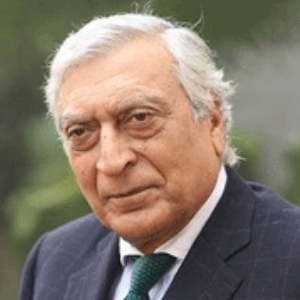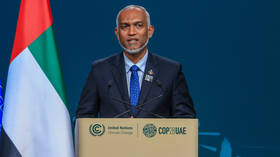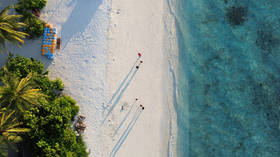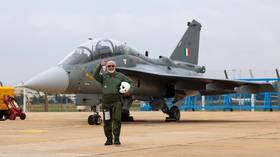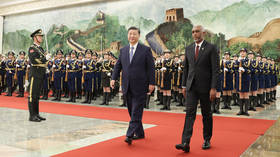Kanwal Sibal: India knows a way to deal with another 'China challenge' in the neighborhood
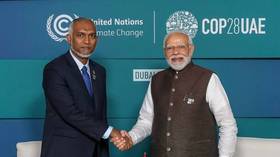
On January 15, Maldives President Muizzu’s government set a March 15 deadline for India to withdraw its troops from his country, following months of negotiations on the matter and a recent diplomatic spat over “derogatory comments” that several of the island nation’s officials made on social media regarding India’s Prime Minister Narendra Modi.
The current tension between Muizzu’s government and New Delhi has several contexts.
There is a general one that does not apply to the Maldives alone. India, as a big country, looms very large in its neighborhood, creating insecurity among the much smaller neighbors, irrespective of its policies. These smaller neighbors fear interference in their internal affairs, and harbor concerns about being dominated and becoming over-dependent.
Often the bigger neighbor is used as a whipping boy in internal political battles. It is commonly accused of being hegemonic and treating the smaller neighboring nations as its “backyard.” This situation is not unique to India – other large countries with smaller neighbors face similar problems.
The smaller nations therefore reach out to external powers to balance the bigger neighbor. In the case of India’s neighbors, China plays that role. Pakistan, Nepal, Bangladesh, Sri Lanka and the Maldives have, in New Delhi’s view, played the ‘China card’ against it for decades.
Since 2013, when Beijing conceptualized its Belt and Road Initiative, this card has become more effective. Under this initiative, China has been building large infrastructure and other projects in all the countries noted above. China’s “maritime silk route” strategy in the Indian Ocean, and the acquisition of port facilities in India’s neighborhood, which also facilitates the movement of its naval and “research” vessels, is a strategy in which India’s smaller neighbors are willing to cooperate.
Another context that cannot be ignored is India’s own concerns – especially those in the strategic security domain.
India-China relations deteriorated sharply in 2020 after the deadly clashes in the Galwan Valley in Ladakh region; in the aftermath, up to 50,000 troops on each side still face each other at close range with little sign of de-escalation. As a result, China’s overtures to India’s smaller neighbors have become a big worry for New Delhi. Therefore, China’s enhanced presence in the region affects India’s relations with its neighbors, raising concerns at the bilateral level.
Zoom in on the Maldives. China has been paying a great deal of attention to the island nation in recent years. It has undertaken major infrastructure projects in the country and sought to acquire islands in the archipelago for “development” purposes. To make this happen, the Abdulla Yameen government (2013-18), which was oriented towards Beijing and antagonistic towards New Delhi, amended the country’s constitution in 2015. The amendment allowed foreigners to own land if they were ready to invest an amount of $1 billion or more. The move raised concerns that the land could be used by foreign powers for military purposes. The law was eventually repealed in 2019 by the new government.
The Maldives, which is made up of 1,192 coral islands, stretches across major maritime channels in the Indian Ocean through which a great deal of Chinese maritime traffic passes. Beijing seems to have concerns about India’s presence in these islands – as it can monitor the traffic. Before the Covid-19 pandemic, the Chinese dominated the island nation’s tourism sector, but lately, the inflow of Indian tourists has grown tremendously. In 2023, India topped the list of those sending tourists to the Maldives (209,198), a market share of around 11.8%.
There is another, more complex angle, hidden from the eyes of many commenters. The Maldives’ internal politics is deeply divisive, with a great deal of volatility. It spills into its foreign policy, including its relations with India and China. Ties with New Delhi have been traditionally close, with India giving importance and priority to the Maldives as a neighbor.
In 1988, New Delhi thwarted a coup attempt against then-President Maumoon Abdul Gayoom (1978 to 2008). India was the first country to respond when the tsunami struck the Maldives in 2004, and when a water crisis hit Male in 2014. India also helped the nation in preventing a measles outbreak in January 2020 by supplying it with 30,000 vaccine doses, and in providing rapid and generous assistance during the Covid-19 pandemic.
Out of Maldives’ 1,192 islands, 187 are inhabited. The country has a large Exclusive Economic Zone (EEZ) of 923,322 square kilometers. Monitoring the EEZ and otherwise ensuring its own maritime security presents a major challenge, which India has helped with as a longstanding partner in assisting the island nation. Since 1988, defense cooperation between the two countries has expanded.
During Mohamed Nasheed’s presidency (2008-2012), India supplied its neighbor with radars and helicopters and built a military hospital. New Delhi also provides medical training and humanitarian and disaster response assistance and helped with search and rescue operations as well as medical evacuations. India has been the Maldives’ partner for hydrographic mapping and maritime domain awareness. Indian pilots and engineers operate the aircraft which have been gifted to the nation. New Delhi offers the largest number of training opportunities for the Maldivian National Defense Forces,meeting around 70% of their defense training requirements.
This cooperation continued during the presidency of Abdulla Yameen (2013-2018), even though he leaned heavily towards China. It is important to underline that all the India-aided facilities and platforms operate directly under the Maldives National Defense Force (MNDF). Indian defense personnel in the Maldives number about 75 people.
President Muizzu seems bent on confronting India and is seeking an end to existing defense arrangements. He has already revoked the Hydrographic Survey Agreement. Male also skipped the latest national security advisor-level meeting, the Colombo Security Conclave, a maritime security grouping formed in 2011 in which the Maldives is a member state along with India, Sri Lanka and Mauritius.
President Muizzu made ‘India Out’ the main plank of his election campaign, contrasting with the Solih government’s ‘India First’ policy, which underlines the toxic political competition in the country between those who understand the positive aspects of Maldivian ties with New Delhi and those who seem to be guided by foreign interests seeking to dilute India’s presence in the country.
India did not interfere in the election process, even when the opposition was vociferously campaigning for India Out. This should set to rest the propaganda which bemoans India’s “hegemonic”, “big-brother” attitude towards the Maldives and its lack of respect for the island nation’s sovereignty.
The reality is, that in addition to a divided polity at home and the perceived utility of countering India with the ‘China card', the “Islamization” of the Maldives is a driving force behind this antagonism towards India by a section of the Maldivian population.
The recent squabble between the Maldives and India was caused by three junior Maldivian ministers making derogatory remarks, personally insulting Prime Minister Modi and mocking the Hindu religion. The reaction in Indian social media has been vigorous, with calls for a boycott on Maldivian tourism.
The three ministers have been suspended and the opposition parties have condemned the offensive remarks against India. India summoned the Maldivian ambassador in New Delhi, but has desisted from making any public statement. All in all, it is not surprising that unlike in the past, when newly elected presidents of the country chose India as their first destination for a state visit, President Muizzu’s first went to Turkey and then – China.
Immediately after returning from Beijing last week, President Muizzu has turned politically even more aggressive, stating that Maldives will not be “bullied” and asking India to withdraw its military personnel by March 15 (a regrettable ultimatum). He also announced that Maldives will reduce its critical dependence on India on basic food supplies and medical treatment (with Thailand and UAE as alternatives under the country’s healthcare insurance scheme) and get help from China to expand agricultural growth to ensure food security.
Maldives will import staple foods such as rice, sugar and flour from other sources such as Turkey.New Delhi will of course meet the political challenge that President Muizzu poses to bilateral relations and the greater space he is opening for increased security threats to India by unfriendly non-regional powers. The ‘China challenge’ is not new for India, as under former President Abdulla Yameen China expanded its presence in Maldives.
India is pragmatic enough to understand the dynamics at play, which it has faced before, in the Maldives and elsewhere in its neighborhood. It has continued to pursue its own priorities, with more trade, more India-financed infrastructure projects, more health care projects, and the like. A mutually beneficial India-Maldives relationship has considerable support in the country. What internal consequences President Muizzu’s hostile policies towards India will have remains to be seen. India will be patient and respect Maldivian sovereignty.
India believes in the Neighborhood First policy. If Maldives under Muizzu repudiates a Neighborhood First policy of its own, India will wait and watch.
Where India Meets Russia – We are now on WhatsApp! Follow and share RT India in English and in Hindi
The statements, views and opinions expressed in this column are solely those of the author and do not necessarily represent those of RT.
